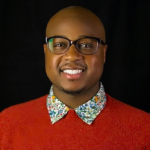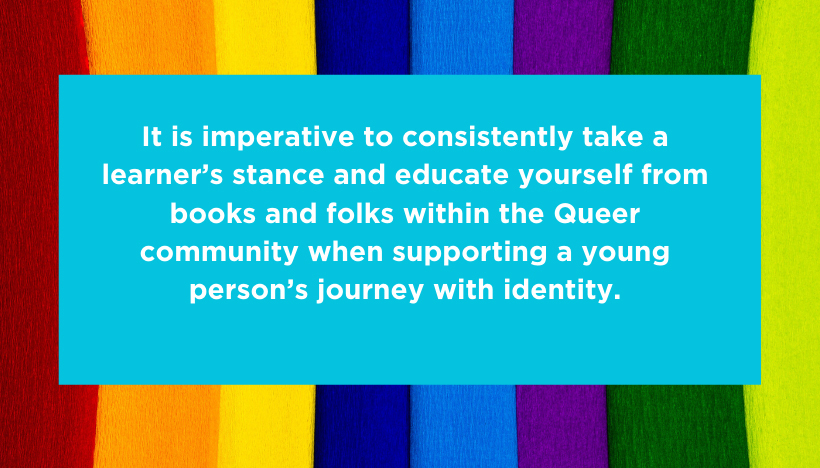From the NCTE LGBTQ Advisory Committee
This post was written by LaMar Timmons-Long and Cody Miller, members of the NCTE LGBTQ Advisory Committee.
Note: This post contains spoilers for the Hulu show Love, Victor.
On June 17th, Hulu released the original series, Love, Victor. The show was created as a television sequel to Love, Simon, which was the cinematic adaptation of the young adult novel Simon vs. the Homo Sapiens Agenda. Love, Simon focused on the emotional journey of an upper-middle class, White cisgender gay character coming to terms with his sexuality in suburban Atlanta. Set in the same school as the original movie, Love, Victor centers a working class, Latinx cisgender character sorting out his own sexual identity in the midst of a recent move from Texas. Throughout the show’s 10-episode run, Simon gives Victor advice through Instagram direct messages. In episode eight, Victor takes a trip to New York and finally meets Simon along with Bram (Simon’s boyfriend from the movie), and their queer roommates. The importance of LGBTQ community and kinship is a vital theme that animates the show’s run.
As with any text, we have critiques of the show as well as praise, but for this piece, we want to focus on how we believe Love, Victor can inform our classroom practices. We’ve spent hours discussing the show since it first aired in late June. Love, Victor speaks to both of us as queer educators for various important reasons.
LaMar
As a Black queer educator whose work is centered on amplifiying Black and Brown students’ voices and experiences, especially Black and Brown queer youth, it was a privilege to watch the show Love, Victor and see how the intersectionality of identity and faith can cause a person to ponder their place in the world. Truthfully, Love, Victor, paints a vivid picture of the journey of identity for our youth. This television show has given light to an issue that any queer youth face throughout their teenage years.
Cody
As a cisgender, White queer teacher who has had the honor to spend many hours before, during, and after school working and sharing life experiences with LGBTQ students, there was something particularly moving about watching the titular character from Love, Simon give life advice to the eponymous character from Love, Victor. The particular scene in episode eight, “Boys’ Trip,” reminded me of the knowledge I bring as a queer educator to schooling spaces.
LGBTQ Kindship and Chosen Family
LGBTQ people have historically created their own chosen family in response to rejection and oppressive policies. These chosen families provide emotional as well as material support that are life-saving. They represent a type of queer kinship that bind together LGBTQ people in ways that don’t always align with dominant ways of thinking about family. Journalist Sandy Allen reminds us that family is “less a noun and more a verb.” Simon, as we see throughout the film that bears his name, comes from an upper-middle class White family who accept him for being gay. It is important to note that from a material and emotional standpoint, Simon has privileges that many LGBTQ people who construct chosen families do not.
In the eighth episode, the chosen family that Simon and his friends have created quickly expand their circle to envelop Victor, someone they mostly know through secondhand accounts and Instagram direct messages. Simon informs Victor that he shared Victor’s troubles with his roommates not to shame or mock Victor’s naiveté, but to draw on their collective queer knowledges to support Victor in navigating his particular contexts. Simon names his own privileges in this moment and acknowledges the limitations of his own experiences. Rather than position himself as some type of omniscient figure who can universalize his experiences onto others, Simon informs Victor that his sagacious social media messages have been informed by Simon’s chosen family. In this moment, the strength of queer kinship shines.
Classroom Connections
In addition to being a warming narrative to watch in an especially difficult time, Love, Victor also offers insights into how to imagine our classrooms and teachings as spaces where LGBTQ youth can be affirmed and loved. Scholars like Ed Brockenbrough and LGBTQ Advisory Committee member Summer Pennell have studied how queer kindship can manifest in educational spaces. We take their insights and our own to offer the following:
- In episode eight, Simon recognizes that his knowledge base for some of the situations that Victor faced was limiting. Therefore, Simon called on the knowledge of others within the queer community to educate him on the best ways to support Victor. It is imperative to consistently take a learner’s stance and educate yourself from books and folks within the queer community when supporting a young person’s journey with identity. Also, if you learn something new from LGBTQ people, especially BIPOC LGBTQ people, pay them for their time and labor. In off- and online spaces, BIPOC educators are often asked to perform labor for White colleagues without payment. Responding to a request like, “Can I pick your brain?” or “Can you help me brainstorm this idea?” or “Can I get feedback on this project” or “What do you think about this idea?” is a form of labor for BIPOC educators that White educators don’t always code as such. It’s vital that the intellectual labor of BIPOC educators is compensated.
- At the beginning of episode nine, Victor informs his new best friend Felix that he is gay and Felix replies, “I really don’t have the perfect thing to say but I’m really happy you told me and this doesn’t change anything between us,” and the two friends share a warm embrace. Coming to terms with identity can be difficult for queer youth; so get out of your own way. Make sure that you lead with an open mind and an open heart ensuring that the student feels loved and supported with their identity. Do not center yourself in conversations about LGBTQ students’ identities and experiences.
- In the first episode of Love, Victor, he is greeted by his new assistant principal played by the phenomenal Natasha Rothwell, who then highlights one of the school’s most iconic moments: the Ferris wheel scene from Love, Simon. Immediately, Victor feels his new high school is a safe and brave space for him to explore his identity. School leaders are essential to the school’s welcoming and affirming culture. School leaders must create spaces that celebrate LGBTQ history, life, and culture. Place the LGBTQ flag that includes transgender Black identities in areas throughout the school. During celebrations such as Black History Month, Asian History Month, Women’s History Month, and Pride Month, highlight BIPOC queer pioneers who have left a mark on the world.
- Lastly, in episode eight, Victor takes a trip to visit Simon in New York City. Bram takes Victor out to play basketball. However, little does Victor know that he is playing basketball with an all-gay league. In his moment of realization, Bram is able to show him that the LGBTQ community is very diverse in race, ethnicity, and gender expression. Show and talk to your students, especially your LGBTQ students, about the diversity of LGBTQ communities.Throughout your classrooms, use documentaries, young adult literature, social media, and music to show real-world examples of the community and the impact of LGBTQ people on the world.
We hope these suggestions inform your own teaching in the upcoming school year. Our LGBTQ students deserve loving and affirming spaces. The type of affirming experiences Victor and Simon have in their narratives shouldn’t be relegated to fiction. Lessons from Love, Victor can be used to make these experiences part of daily life for LGBTQ youth.

LaMar Timmons-Long, a member of the NCTE LGBTQ Advisory Committee, is an English teacher in New York City and an adjunct professor at Pace University’s School of Education. He is passionate about racial linguistics, anti-racist education, social justice and equity in schools concerning all students of color and LGBTQA+ youth. You can follow him on Twitter @teachltl.

Cody Miller is an assistant professor of English education at the College at Brockport, State University of New York. During his seven years as a high school English teacher and in his current role, he positions texts as vehicles to discuss broader socio-political issues in students’ lives and worlds. He can be reached at hmiller@brockport.edu or on Twitter @CodyMillerELA.
It is the policy of NCTE in all publications, including the Literacy & NCTE blog, to provide a forum for the open discussion of ideas concerning the content and the teaching of English and the language arts. Publicity accorded to any particular point of view does not imply endorsement by the Executive Committee, the Board of Directors, or the membership at large, except in announcements of policy, where such endorsement is clearly specified.

